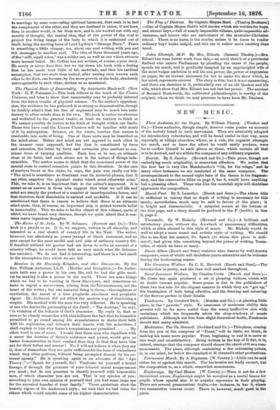The Physical Basis of Immortality. By Antoinette Blackwell. (New York
: G. P. Putname.)—This book follows in the track of the Unseen Universe, and tries to show that immortality may be probably inferred from the latest results of physical science. To the author's apprehen- sion, the evidence he has gathered is as strong as demonstration, though he frailly admits that his line of argument may be much less satis- factory to other minds than to his own. His book is rather too abstruse and technical for the general reader, at least we venture to think so We cannot possibly do justice to his train of thought within our limits. Those who have read the Unseen Universe will be familiar with much of it by anticipation. Science, on the whole, teaches that nature is resolvable into units of being. One of these units may be described as the mind-atom. Matter and mind are not opposed to each other in the manner once supposed, but the first is constituted by force and extension, the latter by force and extension plus sentient or con- scious force of varying qualities. Each has, so to say, an ultimate atom at its basis, and such atoms are in the nature of things inde- structible. The author seems to think that the occasional power of the mental state to control sensation points in this direction. In the case of martyrs burnt at the stake, he says, the pain was really not felt. "The mind is sometimes so dominant over its material phases, that it can often negative the physical states which must otherwise arise." This, we take it, is an important liak in the author's argument. It is meant as an answer to those who suggest that what we call life and mind are simply the product of a number of interdependent forces, and that therefore their dissolution is natural and probable. If it can be established that there is reason to believe that there is an ultimate mind-atom, then, of course, an important step is gained towards belief in immortality. This we take to be the object of this volume, parts of which we have found very obscure, though we quite admit that it con- tains many ingenious thoughts.






























 Previous page
Previous page